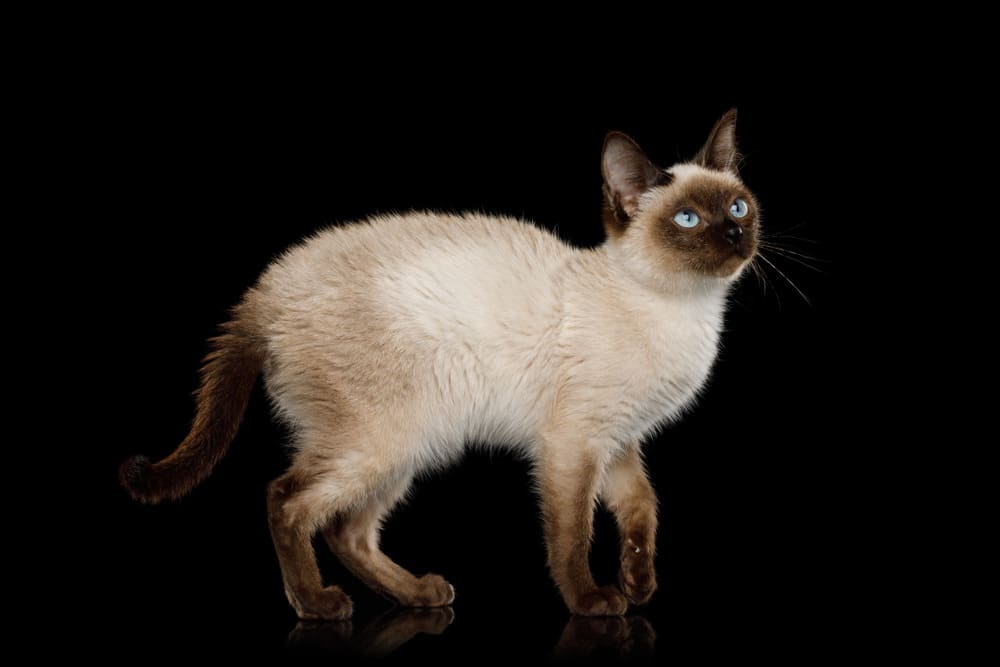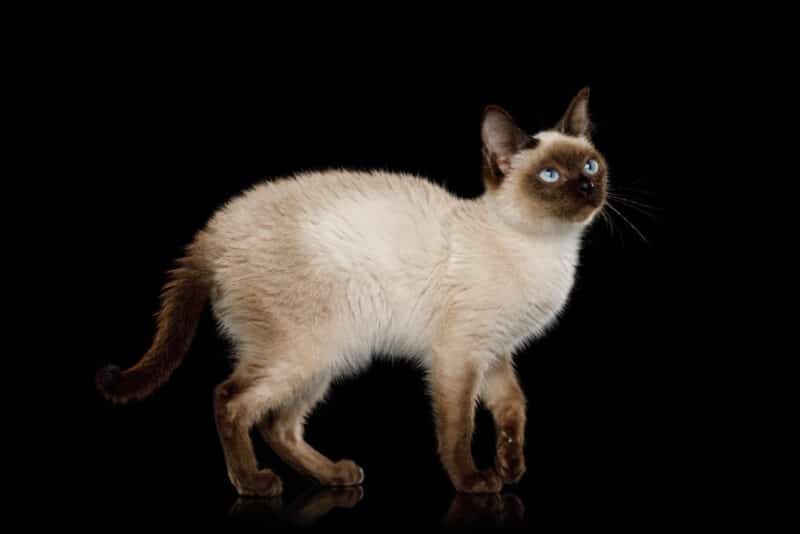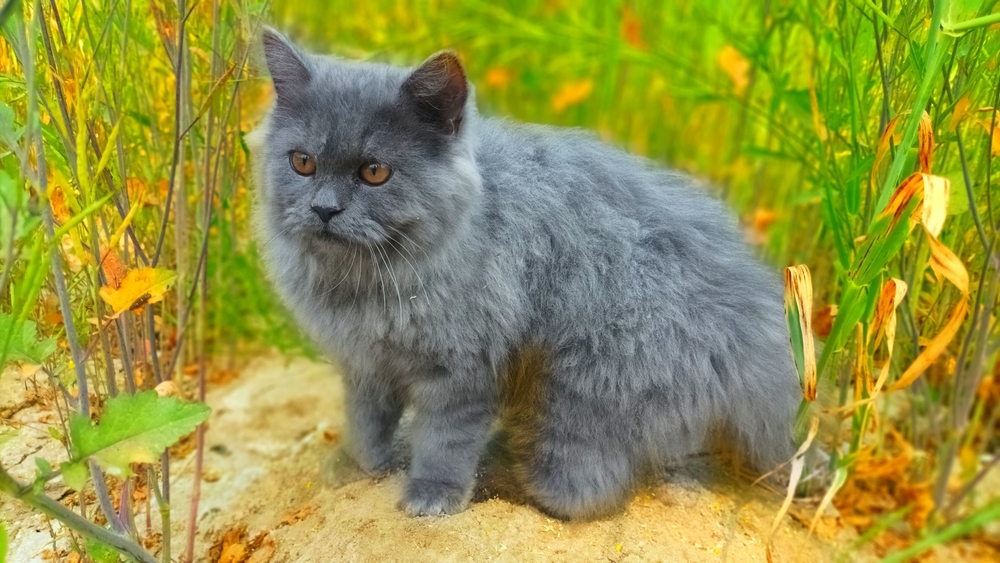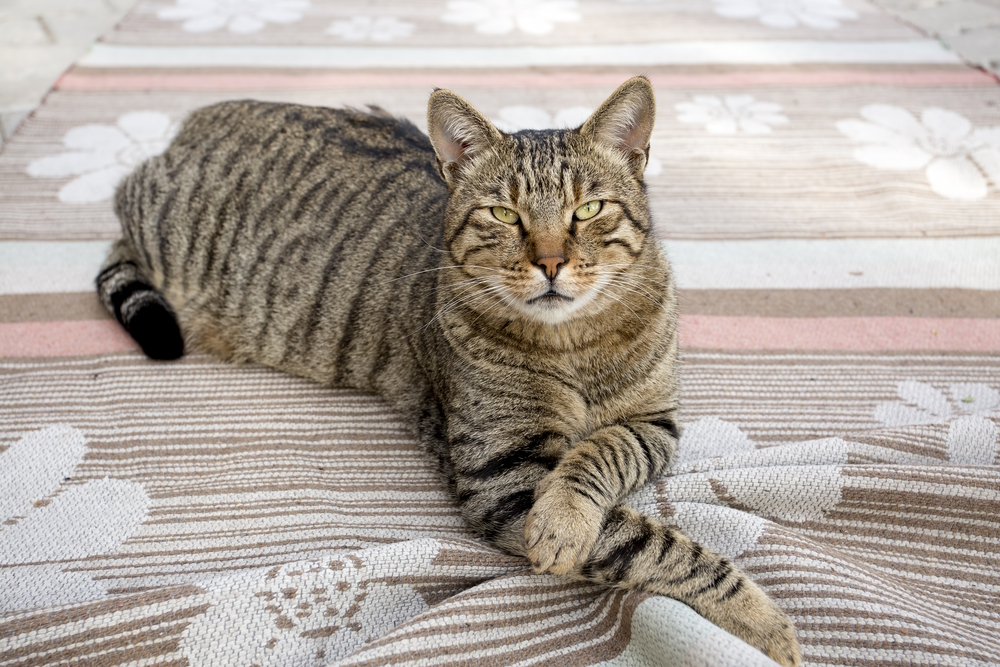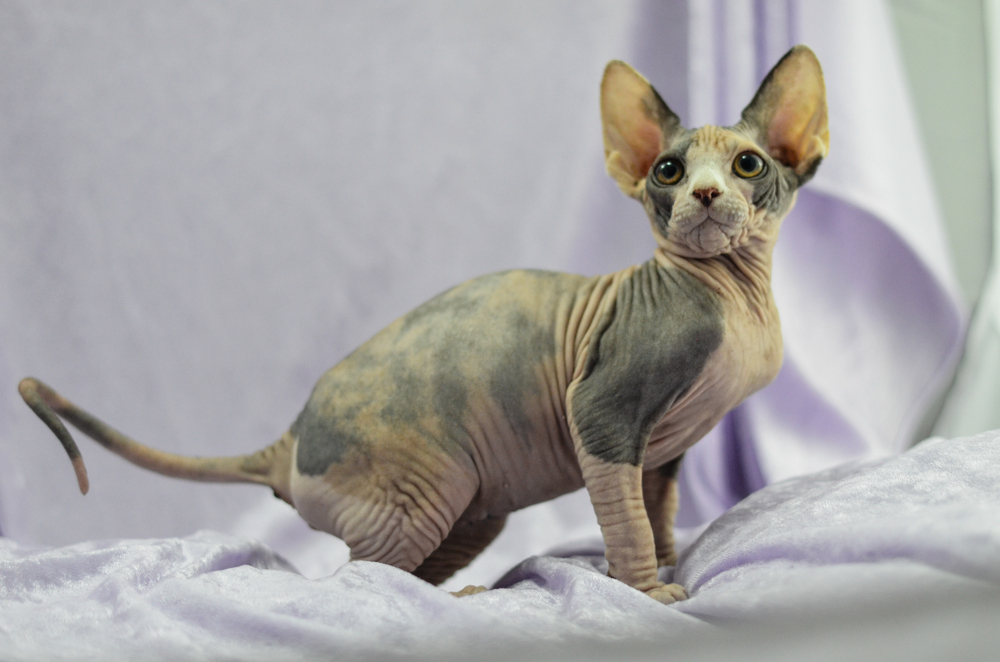Click Below to Skip Ahead
Breed Overview
Height:
8 – 10 inches
Weight:
4 – 7 pounds
Lifespan:
14 – 15 years
Colors:
All colors and patterns, but predominantly colorpoint
Suitable for:
Multi-pet households, those looking for a low-shedding cat, apartment living, families with children, owners who are home often
Temperament:
Affectionate and social, intelligent, playful yet docile, and bold
Unlike some other diminutive pet breeds, the Toybob is tiny due to naturally occurring genetic mutation. They’re simply designed to be small!
The Toybob was first discovered in Russia during the 1980s, where their bobbed tail and short stature earned them a lot of love. Due to their appealing appearance, their popularity has surged in the last decade. In many countries, Toybob breeding programs are sprouting to continue developing and refining this special breed. To learn more about what makes the Toybob so incredible, we’ll take an in-depth look at all the breed’s qualities.
Toybob Characteristics
Toybob Breed Kittens
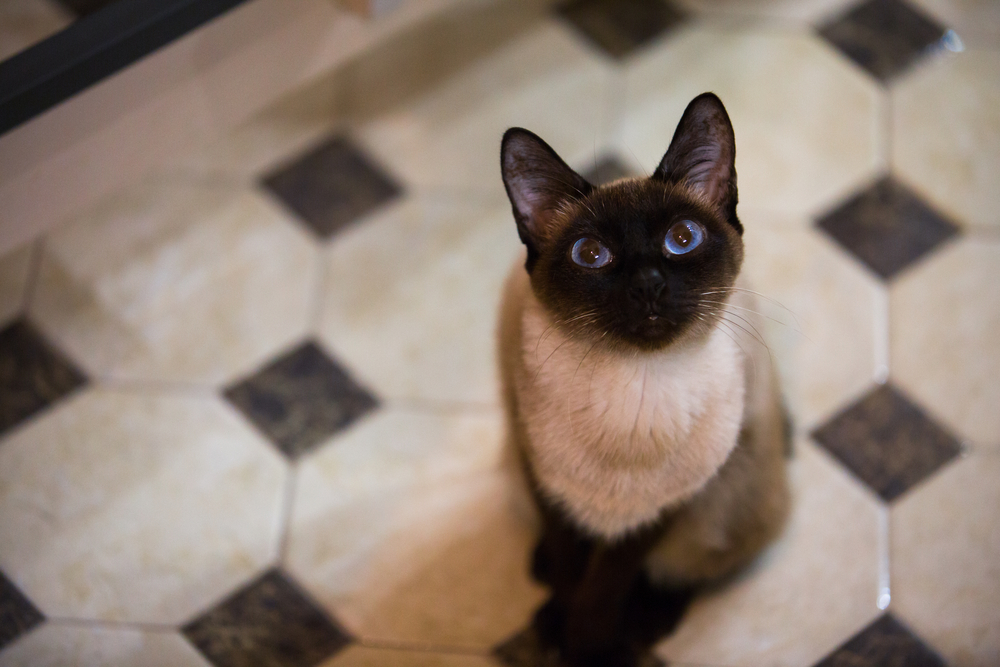
Before you bring a Toybob kitten home, you should be prepared to care for a kitten. Purchase all of the general pet care supplies beforehand, such as feeding bowls, litter boxes, grooming tools, beds, toys, and more. Toybobs are intelligent and playful kittens, so they will need lots of entertainment opportunities to ensure they don’t get themselves into trouble.
While it may take some time for your Toybob to warm up to you, they’re exceptionally affectionate once they’re comfortable with you. They love to cuddle with their favorite humans.
Finding a Toybob may be a slight challenge. It isn’t as likely that your local animal shelter has a purebred Toybob in need of adoption, but it is never a bad idea to reach out to them and check. If there is a Toybob there, then you can get a new pet and provide a home for an animal in need at the same time. Otherwise, you may need to browse local pet stores or search for a breeder that specializes in purebred Toybob cats.

Temperament & Intelligence of the Toybob
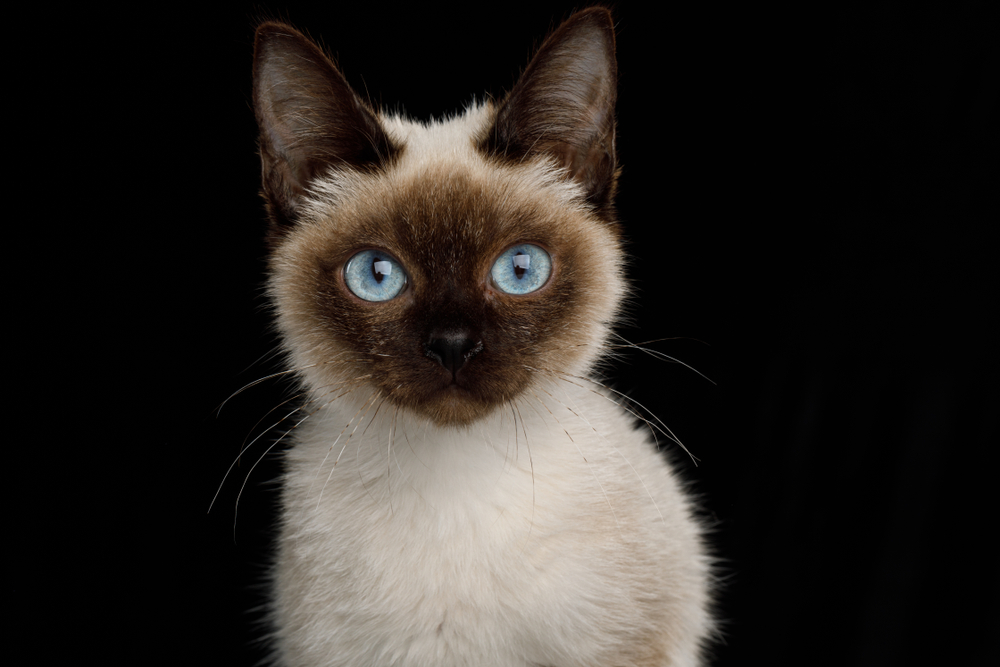
The Toybobs’ appearance wins over many cat lovers’ hearts, but it’s their delightful personalities that often seal the deal. These cats are excellent pets due to their gentle nature and cheerful demeanor.
They are curious cats who enjoy following you around and being involved in whatever activity you are doing. This makes them a great family pet, as they love to be included in family activities. Their curiosity and cleverness may get them into some mischief, so it is recommended that you have puzzle feeders or other mentally stimulating activities available for your Toybob.
Despite their size, they’re lively. They have no trouble scaling high bookshelves or cabinets, so make sure that fragile valuables are stored somewhere secure. Though they are energetic, they are not as hyperactive as some cats. Once the Toybob has had their adventure, they’ll want nothing more than to curl up in your lap.
Another quality that many pet owners love about the Toybob is that they are fairly quiet. Some cat breeds are prone to loud vocalizations, such as yowling, but the Toybob leans more on the silent side. This makes them a great addition to apartment households, as they aren’t liable to irritate neighbors with loud sounds.
Are These Cats Good for Families?
Toybobs are great candidates for family cats. They are sweet-natured, friendly, and entertaining. Their great personalities make them excellent companions for children, adults, and seniors alike. In addition, the Toybob does not like to be left alone for long periods of time, so having multiple people in the house is a good way to ensure that your cat doesn’t grow lonely.
Does This Breed Get Along With Other Pets?
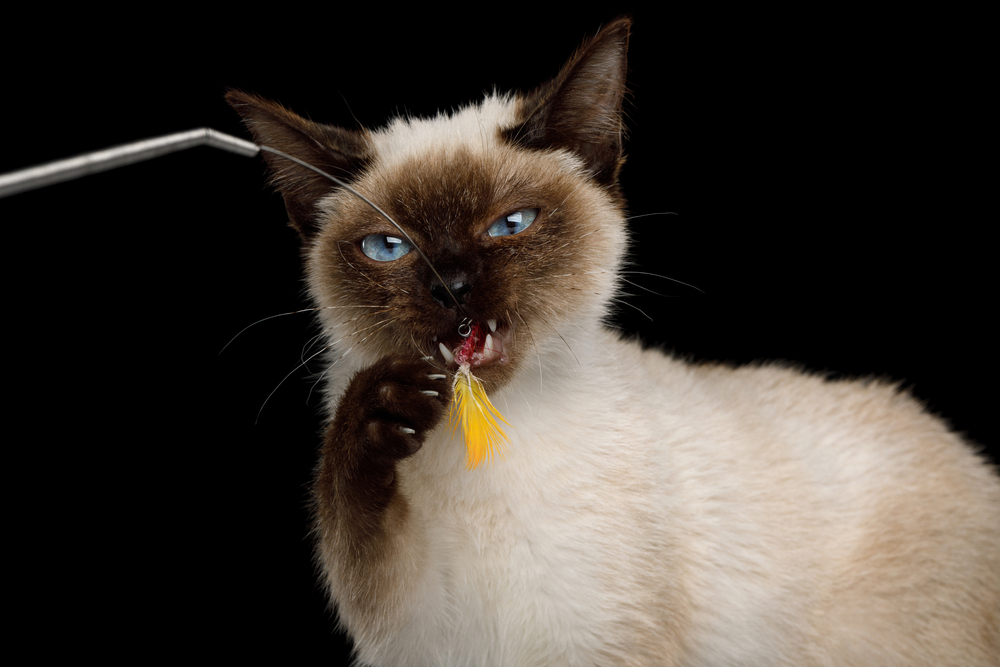
The Toybob gets along excellently with other pets. In fact, many Toybob owners and breeders recommend that the Toybob be housed with another animal companion due to their social nature. Without adequate socialization, the Toybob may become lonely and even depressed.
When considering an animal companion for the Toybob, keep their small size in mind, as larger animals may not be suitable roommates. No matter how kind and gentle a Great Dane is, for example, they may accidentally step on or knock over a tiny Toybob and hurt them due to their significant size difference. Similarly, dogs with high prey drive should be reconsidered, as they may view the Toybob as prey. Therefore, carefully consider the ideal companion for your Toybob before introducing them to each other.
Things to Know When Owning a Toybob
Toybob owners need to know more about their pets than just their temperament and intelligence. To take the best care possible of your pet, you should have a good understanding of their dietary needs, exercise and training requirements, and more.
Food & Diet Requirements
Like any cat, you should provide a high-quality diet for your Toybob. During your pet’s various life stages (such as kitten, adult, and senior), make sure you are providing them with a nutritionally appropriate diet that meets their needs.
Monitor your cat’s food intake to ensure that they are not eating too much or too little. Obesity is a common health issue among cats, so providing appropriate proportions for your Toybob is essential for their health.
Consulting your vet is the best way to provide a healthy, proportionate meal for your Toybob. Your vet will be able to consider your Toybob’s age, gender, health status, and other qualities to determine how much your cat should eat each day. Following your vet’s recommendations is a smart and easy way to keep your cat healthy.
Exercise
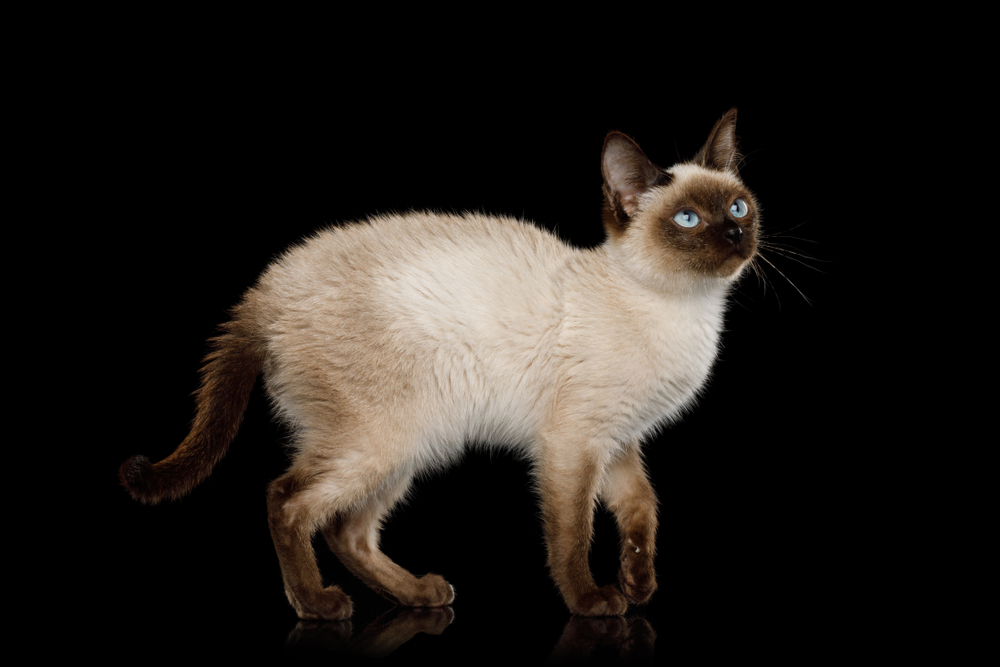
Toybob cats are moderately active and should be given regular exercise to stay healthy. One of the easiest, most effective ways to keep your Toybob moving is by engaging them in regular playtime. As a playful, social cat, Toybobs will prefer to play with you rather than play alone. Similarly, you can purchase plenty of interactive toys for your cat so that you can rotate them every week or so, keeping your Toybob interested in playing with their toys.
Training
As an intelligent, social cat, the Toybob is a great pet to train. The more interactive your training sessions are, the more likely you will keep your pet engaged. Once you have taught your Toybob the house rules, you can move on to teaching them neat tricks to entertain houseguests.
Positive reinforcement is going to be your friend during the training process. Have plenty of tasty treats on hand to reward your Toybob for their successes. Negative reinforcement is not effective with Toybobs and can contribute to a damaged relationship, so avoid punishing or shouting at your cat.
Grooming
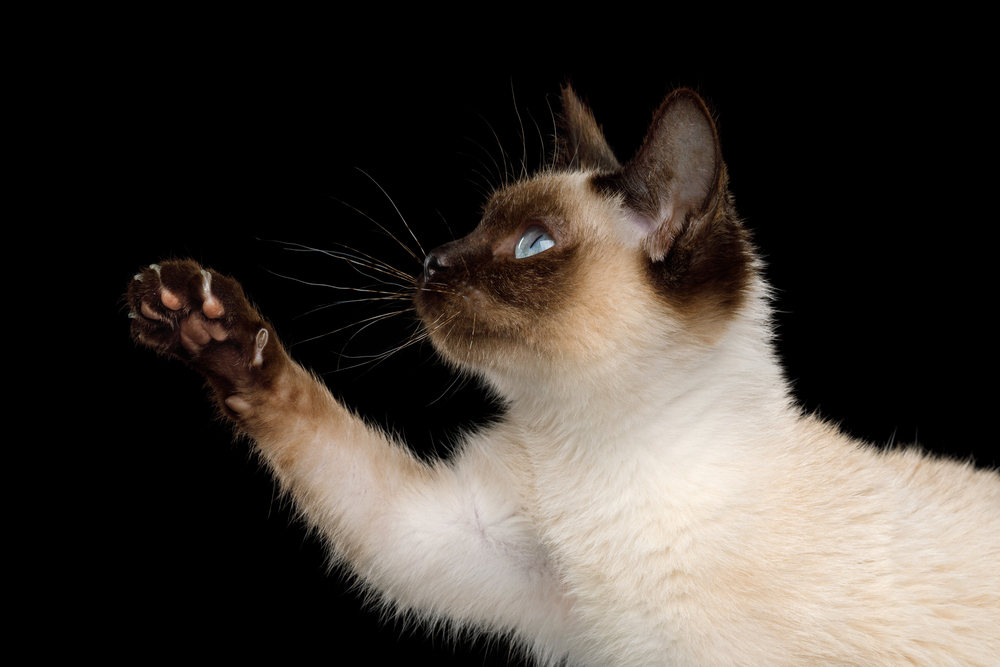
Typically, the Toybob is a low-maintenance pet in terms of grooming care. No matter how long your cat’s fur is, it should only need to be brushed once or twice per week. However, you may need to brush them more often during shedding season. Other areas you should pay attention to are your Toybob’s ears, nails, and teeth.
Ears should be cleaned regularly to prevent the accumulation of earwax and debris.
Similarly, their nails should be trimmed at least each month to avoid pain or infection. Providing your cat with a scratching post is a great way to keep their nails dulled naturally.
Furthermore, cleaning your Toybob’s teeth should be a part of your regular grooming routine. Dental hygiene can quickly become a problem for pets, especially if their owners do not help them to keep up with it. With feline toothpaste and a feline toothbrush, you can regularly brush your cat’s teeth to fight dental disease.
Health and Conditions
In terms of health, the Toybob is a hardy cat. They have a decent lifespan of 14–15 years and are not known to have many genetic conditions. As a Toybob owner, you should take your cat to the vet for annual checkups and as needed to monitor for conditions that all cats (regardless of breed) are susceptible to.
The biggest concern your vet will watch out for is obesity. Obesity is a prevalent issue among cats and can contribute to other worrying conditions such as diabetes, heart problems, and arthritis. Therefore, being proactive about maintaining your cat’s weight is a crucial part of managing their health and quality of life.
Another issue that many cats suffer from is dental disease. It is said that anywhere between 50–90% of cats over the age of four suffer from some form of dental condition. With that being the case, it is vital that you keep an eye on your cat’s dental health to ensure that they do not develop dental issues such as gingivitis, periodontal disease, or tooth resorption.
Some Toybob owners report that their cats occasionally struggle with digestive issues. While a specific digestive condition is not known to be prevalent in the breed, it is still something to be aware of. If you notice your Toybob seems to struggle with digestion, consult your vet and consider special feline diets for sensitive digestion.
- Dental disease
- Digestive issues
- Obesity
Male vs Female
On average, male Toybob cats tend to be slightly larger than female Toybob cats. However, this is not a guaranteed rule.
In addition, some Toybob owners may report differences in personality between the sexes. While some trends can be observed, these are largely anecdotal. The biggest determining factor in your cat’s behavior is not their sex but their personality.
3 Little-Known Facts About the Toybob
1. Toybob Cats Stand Apart from Other Bobbed Tail Breeds
The Toybob is not the only bobbed tail breed in the world, as there are cats such as the American Bobtail, the Japanese Bobtail, and the Pixie-Bob. However, unlike these other breeds, the Toybob’s bobbed tail is caused by an entirely different gene than the one that creates bobbed tails in other breeds.
2. The Length of Their Tail Varies
The bobbed tail is a key feature in the Toybob breed, but its length isn’t always consistent. Some Toybob cats will have rabbit-like tails, whereas others may have tails up to a few inches long.
3. All Toybob Cats Can Be Traced Back to One Progenitor
The origins of the Toybob can be traced back to Russia in 1988 when two seal-point cats were bred to create a tiny bobbed-tail cat. This male kitten was named Kutsyi, and unbeknownst to him, he was the progenitor of the Toybob breed.
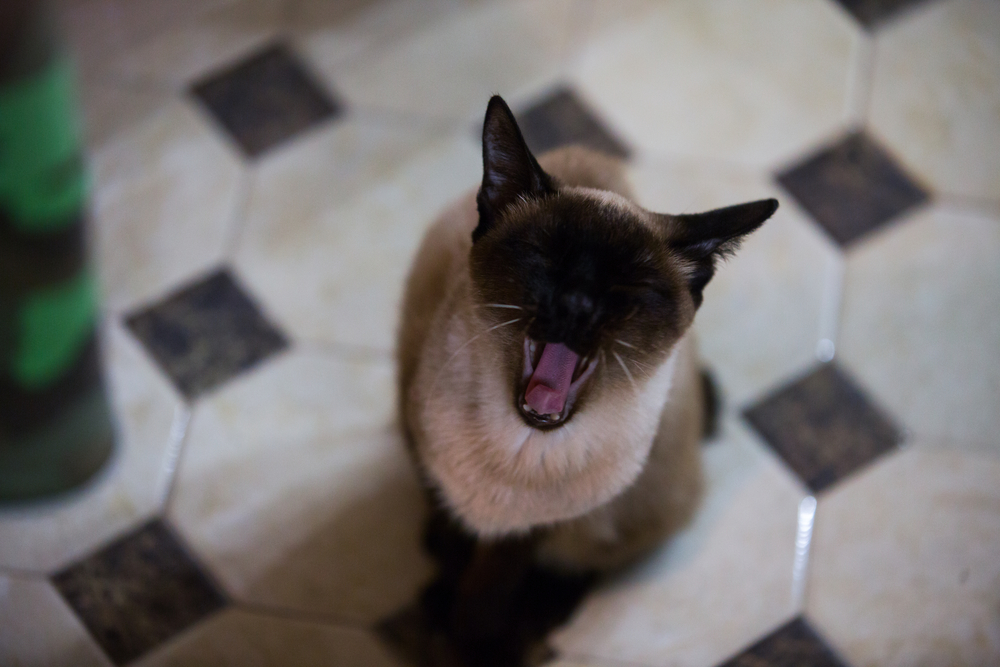
Final Thoughts
Toybob cats are unique, adorable pets that stay kittenish in size and personality. Their gentle disposition and playful attitudes make them ideal companions for children, adults, and seniors alike, and due to their social natures, they are excellent additions to multi-pet households. In the same vein, Toybobs can quickly become lonely and agitated if left alone for long periods of time, so they aren’t ideal for those looking for an independent pet.
With a Toybob cat in the home, there will never be a dull or lonely moment. You will always have a tiny friend following you at your heels, eager to participate in whatever task you are working on. And at the end of the day, you’ll have an adorable snuggle buddy that fits perfectly on your lap.
Featured Image Credit: Seregraff, Shutterstock

